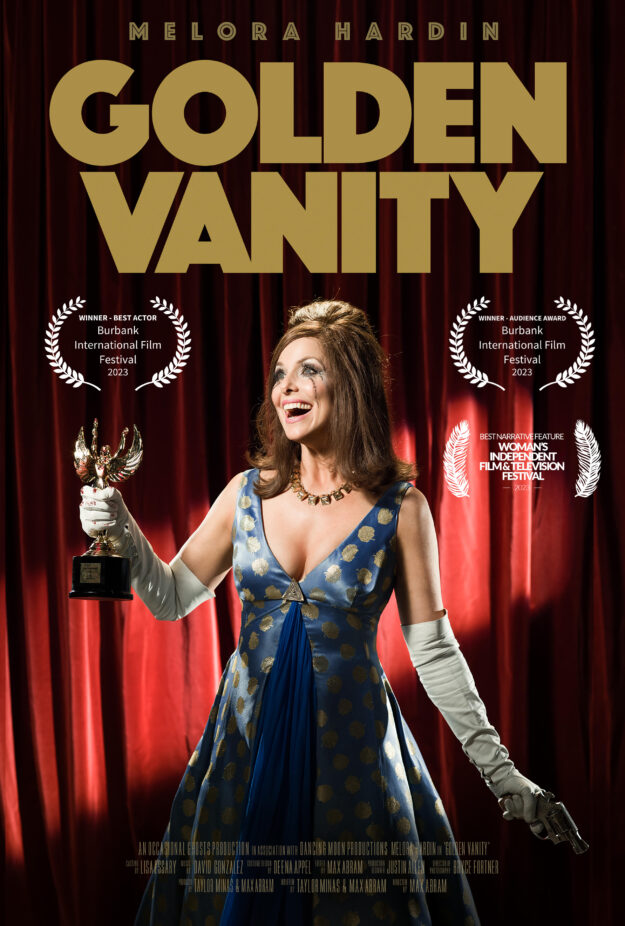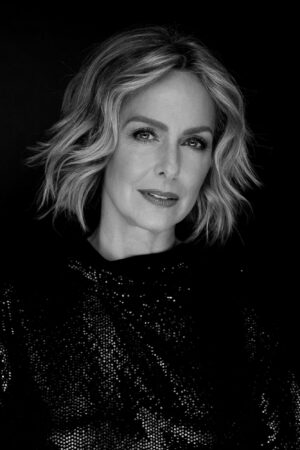Widgetized Section
Go to Admin » Appearance » Widgets » and move Gabfire Widget: Social into that MastheadOverlay zone
Melora Hardin finds light in dark topic, times with new one-woman film in Vail

VAIL, Colo. — Melora Hardin sees certain aspects of her five-decade Hollywood journey in Mabel Montgomery-Mayflower, the tragically fallen 60s starlet she plays in her new, one-woman film “Golden Vanity”. But let’s be clear, the film is in no way biographical: Hardin is a happy, hard-working and clearly quite gifted actress with a husband and two daughters.
The former “Office” star as Michael Scott’s (Steve Carell) professional antagonist and later awkward love interest Jan Levinson, Hardin does have some real-life twisted Tinseltown tales of betrayal and envy, but nothing that came close to sending her on Montgomery-Mayflower’s suicidal arc in “Golden Vanity”, which shows at the Vail Film Festival at 3:30 p.m., Saturday, Dec. 9 at the Rabbit Hole in Solaris Vail — followed by a Q&A with Hardin.
Nor, Hardin said in a recent phone interview, does she have a specific actress in mind to serve as her actual Liz Fontana foil – the character whom Montgomery-Mayflower accosts on stage but off camera to rip away Fontana’s undeserved Golden Motion Movie Award at the start of “Golden Vanity”. The rest of the film is Montgomery-Mayflower hiding out in her home, drinking, popping pills and recording her own truth about her life and career, before the cops come.

“Oh my God, I love that,” Hardin said of the Fontana question. “I don’t think I’ve ever had anyone like that that’s so in my crosshairs the way that [Fontana is for] Mabel, but as a younger person, I probably went through phases of jealousy, when somebody who was a child actor would go on to win an Academy Award. I can relate to Mabel losing her shit in that moment, because I can feel that young place in me that would feel those feelings of envy and feelings of jealousy and kind of anger and rage at that. So, of course I can relate to all of those feelings.”
There have definitely been rough moments for Hardin in Hollywood over the course of her 50-year career (she started acting for TV on “Police Story” in 1976, and has been in more than 70 films and TV shows since, from “Love Boat” to “Little House on the Prairie” to “Quincy, M.E.” to “Magnum, P.I.” to “Murder, She Wrote” to “Diff’rent Strokes”). It was on that last show where Hardin says she was assaulted by actor Todd Bridges as a teenager. But what Hardin most relates to in Montgomery-Mayflower’s character is a sense of never being enough.
“She wanted to be in the light singing, that’s what she wanted to do,” Hardin says of Mabel. “And you see how she got to be in the light singing, but all the machinations of everybody in the business around her dragged her into the mire and into the dark and into these incredibly traumatic and chaotic places. As far what I relate to about Mabel is just the idea of never feeling like I’m enough. That’s something that she and I absolutely have in common. And then, probably, I’m never enough, and in reaction to feeling that way, I can often be too much.”
Certainly, the statuesque Hardin was physically too much for what would have been her big breakthrough film role as a 17-year-old in late 1984, or at least that was the conclusion of two female film executives Hardin says got her booted as Marty McFly’s girlfriend in the first “Back to the Future” film. The story is now legend in BTF fandom circles, but Hardin says she’s since learned a new twist to the tale.
Hardin says that when actor Eric Stoltz was fired by director Robert Zemeckis and writer Bob Gale for being too serious for the McFly role and the shorter, funnier Michael J. Fox was brought in, Zemeckis called Hardin and told her she was too tall. But she says a writer doing a deep dive on the BTR films told her just last year that “it wasn’t Bob Gale and Bob Zemeckis that thought you were too tall for Michael J. Fox. It was two female executives, who at the time thought it emasculated their main character to have a girlfriend that’s taller than he is.”
“Now, I tell that story because, well, that’s super-sad,” Hardin said. “But that’s because those two female executives had been completely defeminized so much so that they believed the patriarchy telling them that they had to behave like men in a patriarchal society to be the executives that they were. They had bought into that bullshit. But you would never catch someone in 2023, two female executives, saying that. You just wouldn’t. So my point is, we are making progress, and it’s baby steps. Of course, there’s a ways to go, but it’s really important to acknowledge that this stuff is just so ingrained in our society, but we are actually making a little bit of progress.”
Hardin was asked if she feels that progress extends to politics, where women, who make up the majority of the electorate in America, have been flexing that voting muscles in recent election cycles, particularly in the wake of the current U.S. Supreme Court — tipped conservative by the appointments of former President Donald Trump — overturning Roe v. Wade. Hardin responded she doesn’t like to get political because she feels she has fans across the spectrum, but ….
“I believe that this is a country that is about free voting,” Hardin said. “I do not believe, nor will I ever support the idea, that you have to hate somebody because they vote on the diametric opposite end of you. We are such a culture now of divisiveness and fear and hate and anger, and I do not support any of that. We need to come together, we need to learn to talk, we need to learn to disagree, we need to learn to argue without bullying, without storming out, without blocking, without canceling. And those are the things that I’m most interested in.”
But back to the original question:
“Female reproductive rights, to me, should never have been a political issue in the first place. That is not a political issue. It never has been, and it never should have been. And the fact that they’ve taken it over in politics is one of the main problems with politics, because it became this partisan thing that, to me, doesn’t make any sense,” Hardin said, pausing, with a laugh. “I love that I wasn’t going to have a political conversation, and then I think I did a pretty good job of having a political conversation.”
As for “Golden Vanity”, Hardin said it was not daunting to do a solo film, something she’d been studying for over many years and in several writing classes, but more like “playing in a sandbox” to have the camera to herself and not have to work with other actors who might bring their own baggage to the set on any given day. Hardin credits first-time writer and director Max Abram, writer and producer Taylor Minas and a stellar production and creative crew for how the award-winning film turned out.
“They’re first-time filmmakers, and anyone that’s been on any movie set knows that the chances of that all going wrong with first-timers is high,” Hardin said. “This wonderful, quirky script that has so much relevance, but also so much ability to look back and feel into another era long before Taylor and Max were born, says a lot about their creativity — that they were passionate enough to write this and were drawn in enough to this era to make a modern relevance out of it.”
“Golden Vanity” starring Melora Hardin, plays at the Vail Film Festival at 3:30 p.m., Saturday, Dec. 9, at the Rabbit Hole in Solaris at Vail — followed by a Q&A with Hardin. Click here for a trailer for “Golden Vanity”, and click here for a full schedule of films.
Editor’s note: This story first appeared on the Colorado Times Recorder website.


